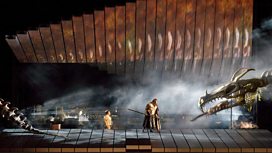
Das Rheingold
From Sage Gateshead, Donald Macleod introduces an Opera North performance of Wagner's Das Rheingold, the first instalment of the famous Ring Cycle.
Donald Macleod introduces Wagner's Das Rheingold from Sage Gateshead, the first instalment of a highly praised complete Ring cycle, given by Opera North.
The performances are semi-staged, with the orchestra in clear vision with the singers, giving the production a special immediacy. Three huge screens showing a specially created visual accompaniment by designer Peter Mumford complement the staging. This is Richard Farnes' last set of appearances with Opera North as their music director.
Sung in German
Cast
Wotan ..... Michael Druiett (bass baritone)
Loge ..... Wolfgang Ablinger-Sperrhacke(bass)
Fricka ..... Yvonne Howard (mezzo)
Freia ..... Giselle Allen (soprano)
Donner ..... Andrew Foster-Williams (baritone)
Froh..... Mark Le Brocq (tenor)
Fasolt ..... James Creswell (bass)
Fafner ..... Mats Almgren (bass)
Alberich ..... Jo Pohlheim (bass)
Mime ..... Richard Roberts (tenor)
Erda ..... Ceri Williams (mezzo)
Woglinde ..... Jeni Bern (soprano)
Wellgunde ..... Madeleine Shaw (mezzo)
Flosshilde ..... Sarah Castle (mezzo)
Orchestra of Opera North conducted by Richard Farnes.
Last on
More episodes
Previous
You are at the first episode
![]()
Opera guide: Wagner's Das Rheingold
Explore Das Rheingold, the first opera in Wagner's Ring Cycle.
Music Played
-
![]()
Richard Wagner
Das Rheingold
Ensemble: Opera North. Conductor: Richard Farnes. -
![]()
Johann Sebastian Bach
Six Little Preludes
Performer: Angela Hewitt (piano).
Synopsis
The branches of the World Ash Tree held together the universe: the upper realms of the gods; Riesenheim, home of the giants; the earth, with the Rhine and his daughters; and Nibelheim, a subterranean realm inhabited by the Nibelungs. The god Wotan drank from the spring of eternal knowledge beneath the World Ash Tree, sacrificing an eye in return for wisdom. He tore a bough from the tree and with it ruled the world, marrying Fricka, guardian of marriage.
Scene I
The three Rhinedaughters – Woglinde, Wellgunde and Flosshilde – are playing. Flosshilde warns her sisters to pay more attention to the duty laid upon them by the Rhinefather of guarding the Rhinegold. Alberich, a Nibelung, watches them, utterly enchanted. Each in turn encourages his advances then cruelly rejects him. Sunlight falls on the gold. Alberich is mesmerized by the sight of the Rhinedaughters revelling in the treasure and asks about it. They tell him that it is the Rhinegold, which if made into a ring would give its owner infinite power over the world; it can be forged, however, only by someone who renounces love. Vehemently cursing love, Alberich seizes the gold.
Scene II
Wotan and Fricka are asleep. Fricka, waking first, sees the fortress built for the gods by the giants Fafner and Fasolt. Wotan is overjoyed at the sight of it. Fricka reminds him that as payment he promised to give the giants her sister, Freia. Wotan dismisses her fears, reminding her that she too wanted the fortress. She reproaches Wotan for his willingness to trade love for power, but he replies that he never had any intention of giving Freia away: he is depending on Loge’s ingenuity to solve the problem.
Freia arrives, terrified, followed by Fafner and Fasolt. Wotan tells the giants to choose another form of payment. Fasolt points to the laws carved on Wotan’s spear and reminds him that they are binding. While Fasolt is eager to have a woman in their home, Fafner is also aware that Freia alone knows how to tend the golden apples that give the gods eternal youth, and without her they will die. The giants prepare to take Freia away and her brothers, Froh and Donner, attempt to intervene. Wotan stops Donner using force.
At last Loge appears. Wotan complains that he would never have agreed to the contract if Loge had not promised to find a way of saving Freia. Loge says he has travelled the world looking for an acceptable substitute for Freia, but has learnt that nothing is of greater value than a woman’s love.
He found only one person who would sacrifice love: Alberich, who stole the Rhinegold. Loge tells Wotan that the Rhinedaughters want his help to get it back. Fasolt and Fafner ask about the gold and Loge explains that a ring forged from it gives absolute power. Gods and giants alike are greedy for it. The giants say they will exchange Freia for Alberich’s treasure.
As the giants leave with Freia, the gods rapidly age: without her apples they are helpless. Wotan resolves to get the gold and descends with Loge to Nibelheim.
Scene III
Alberich torments his brother Mime, who has made a magic helmet, the Tarnhelm, which can transform its wearer into any shape he wishes. Alberich demonstrates its powers. He leaves as Wotan and Loge arrive. Mime tells Loge his tale of woe and recounts how the Nibelungs, once contented craftsmen, are enslaved by Alberich.
Alberich returns, brandishing his ring and driving his terrified slaves back. Loge reminds him of their former friendship, but Alberich scornfully dismisses him and boasts of the fabulous power of the ring: he gained it by renouncing love and will use it to overthrow the gods. Loge challenges Alberich to demonstrate the Tarnhelm’s magic. Alberich turns himself into a giant figure, whereupon Loge and Wotan pretend to be frightened. When Loge asks if he can become very small, Alberich transforms himself into a toad. Wotan and Loge pounce on him, grab the Tarnhelm and drag him out of Nibelheim.
Scene IV
Loge and Wotan mock Alberich and tell him that the cost of his freedom is his gold. Alberich plans to keep the ring, knowing it will enable him to create more treasure. He orders the Nibelungs to bring his ransom and demands his freedom and the Tarnhelm, but Loge claims the helmet. Wotan now insists Alberich give him the ring too. Alberich protests that the ring is more important than his life.
When Wotan reminds him that he acquired the ring through theft, Alberich accuses him of hypocrisy. Alberich’s sin was against himself alone; Wotan’s will be against all existence if he takes the ring. Wotan tears it away from Alberich, who puts a curse on it: it will bring anguish and death to those who possess it while everyone else will be consumed by envy.
Freia returns with the giants, restoring the gods’ strength. Fasolt does not want to give Freia back, and orders that the gold be piled up to hide her from his sight. Loge and Froh heap it up but Fafner claims he can still see Freia’s hair. The Tarnhelm has to be added to the pile. Fasolt cries that he can still see her eye so Fafner demands that the ring on Wotan’s finger be used to stop the gap. Loge says Wotan intends to return it to the Rhinedaughters. Wotan insists on keeping it. The giants are about to leave with Freia when Erda, the earth goddess, appears. She reminds Wotan of the curse on the ring and says a dark day is dawning for the gods: he must surrender the ring.
Erda disappears and Wotan agrees to hand over the ring. Freia is freed. Fafner and Fasolt argue about the division of the treasure. When Fasolt seizes the ring, Fafner kills him. Wotan is horrified at the power of the ring’s curse.
Donner summons a storm to clear the air. A rainbow bridge leads the gods to their new fortress, which Wotan names Valhalla (hall of the slain). As the gods make their way towards it, Loge reflects that they are moving towards their destruction. Wotan dismisses the Rhinedaughters’ lament for their lost gold.
- With thanks to the Royal Opera House.
Broadcast
- Tue 5 Jul 2016 19:15����ý Radio 3
Six ways you learned about Wagner's Ring Cycle without even noticing
From poetry to film via fantasy box sets, here's how you already know these epic operas.



